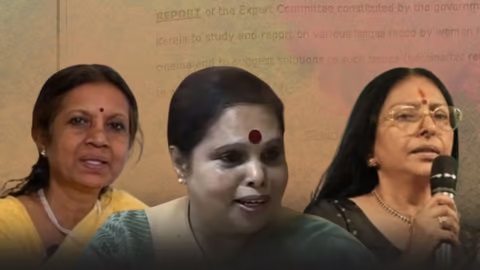The Justice Hema Committee report reveals that evidence indicates prominent and respected figures in the industry have shocked certain women in cinema with instances of sexual harassment and inappropriate physical advances.

Committee members KB Valsala Kumari, K Hema, and actor Sarada.
The Justice Hema Committee Report on the working conditions of women in Malayalam cinema describes sexual harassment as the most severe issue faced by women in the industry. A redacted version of the report was made public on August 19, 2024, highlighting a culture where many women are hesitant to share their traumatic experiences due to fear of retaliation, including industry blacklisting and further harassment.
The report indicates that prominent figures in the industry have sexually harassed women, making unwelcome advances. These issues are rooted in the industry’s structural problems, such as the lack of formal contracts and grievance mechanisms, which create an environment where powerful men exploit their control over women’s careers.
The report reveals that aspiring actresses are often coerced into accepting “adjustments” or “compromises,” which typically means agreeing to sexual favors in exchange for career opportunities. This “quid pro quo” dynamic is a prevalent form of sexual harassment globally, yet until the formation of the Women in Cinema Collective (WCC) in 2017, women in the industry rarely shared their experiences.
The Committee noted that while many specific instances of harassment were redacted to protect privacy, all findings were based on direct evidence, not hearsay. Women reported that harassment often begins during job solicitation and is perpetuated by the expectation that they will comply with sexual demands.
The industry’s male-dominated culture contributes to a “silence” around these issues, with women fearing that speaking out could lead to career destruction and public shaming. Many have faced online harassment and threats to their lives and those of their families, exacerbating the culture of silence.
The report also emphasizes that there is a systemic problem, with no effective grievance redressal mechanism. Complaints against powerful figures are often ignored or dismissed, especially if the accused holds significant market value.
Women testified that the industry’s culture has been persistently harmful, with a lack of formal procedures for addressing grievances. This has led to many suffering in silence, fearing retribution from those in power.
Despite the bleak picture painted, the report acknowledges that not all men in the industry are complicit in the harassment, citing a few who have maintained a respectful work environment. However, it also underscores that the pervasive nature of harassment in cinema is distinct from other fields due to the initial demand for sexual compliance as a condition of employment.
The report reveals that women are often forced to take their parents or trusted relatives to set locations for safety, given the frequent unwanted advances from intoxicated men and the general lack of security.
Formed in 2017 in response to a petition from the WCC, the Hema Committee’s findings were submitted to the Kerala Government in December 2019 but were only recently released after an order from the State Information Commission mandated their disclosure.












